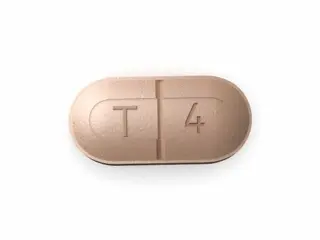Shop Levothyroxine Online UK
| Package | Dosage | Price | Price per Dose | |
|---|---|---|---|---|
| Dosage: 50mcg | ||||
| 200 pill | 50mcg | £95.85 | £0.47 | |
| 100 pill | 50mcg | £81.65 | £0.82 | |

Levothyroxine Description
Overview of Levothyroxine
Levothyroxine is a synthetic form of the thyroid hormone thyroxine (T4), which is naturally produced by the thyroid gland. It is commonly prescribed to treat hypothyroidism, a condition where the thyroid gland does not produce enough hormones. Proper hormone levels are essential for regulating metabolism, energy production, and overall bodily functions. As a medication, levothyroxine aims to restore normal hormone levels and alleviate symptoms associated with thyroid deficiency.
Effectiveness and Benefits
Many patients find levothyroxine highly effective in managing hypothyroidism. When taken as prescribed, it helps improve a range of symptoms such as fatigue, weight gain, cold intolerance, dry skin, and depression. The medication's ability to normalize thyroid hormone levels often leads to a significant improvement in quality of life. It is generally considered a reliable and long-term solution for maintaining hormonal balance. Regular monitoring of thyroid function tests ensures the medication's dosage remains appropriate for each individual.
Usage and Dosage
Levothyroxine is usually taken once daily on an empty stomach, typically in the morning, with water. The exact dosage depends on various factors including age, weight, severity of hypothyroidism, and other health conditions. Doctors often start with a low dose and gradually increase it to avoid adverse effects. It is crucial for patients to adhere strictly to their prescribed dosage and schedule. Inconsistent use or dosage adjustments without medical supervision can lead to either under-treatment or symptoms of overdose, such as rapid heart rate or nervousness.
Potential Side Effects
While levothyroxine is generally safe when used correctly, some individuals may experience side effects. Common adverse reactions include increased heart rate, sweating, anxiety, weight loss, and insomnia. These are often signs of overtreatment and require prompt medical attention. In rare cases, allergic reactions like rash or itching may occur. Long-term overuse can lead to symptoms resembling hyperthyroidism, and thus, regular blood tests are important to ensure therapy remains within safe and effective limits.
Considerations and Precautions
Patients with certain health conditions should exercise caution when using levothyroxine. Heart disease, diabetes, and adrenal insufficiency are some situations where careful monitoring is necessary. It is also important to inform healthcare providers about any other medications being taken, as some drugs can interfere with levothyroxine absorption or effectiveness. These include calcium supplements, iron, certain antacids, and some cholesterol medications. Proper timing of medication intake and coordination with other drugs can help optimize treatment outcomes.
Conclusion
Levothyroxine remains a cornerstone in the treatment of hypothyroidism due to its proven safety profile and effectiveness. Patients should always use this medication under medical supervision, adhere to prescribed dosages, and undergo regular thyroid function testing. When managed correctly, levothyroxine provides relief from symptoms and helps restore normal metabolic functioning. Its widespread use and long-standing history make it a trusted choice for millions living with thyroid hormone deficiency worldwide.
See Also

